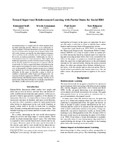Toward supervised reinforcement learning with partial states for social HRI
| dc.contributor.author | Senft, E | en |
| dc.contributor.author | Lemaignan, S | en |
| dc.contributor.author | Baxter, P | en |
| dc.contributor.author | Belpaeme, T | en |
| dc.date.accessioned | 2019-09-02T11:53:00Z | |
| dc.date.available | 2019-09-02T11:53:00Z | |
| dc.date.issued | 2017-01-01 | en |
| dc.identifier.isbn | 9781577357940 | en |
| dc.identifier.uri | http://hdl.handle.net/10026.1/14855 | |
| dc.description.abstract |
Social interacting is a complex task for which machine learning holds particular promise. However, as no sufficiently accurate simulator of human interactions exists today, the learning of social interaction strategies has to happen online in the real world. Actions executed by the robot impact on humans, and as such have to be carefully selected, making it impossible to rely on random exploration. Additionally, no clear reward function exists for social interactions. This implies that traditional approaches used for Reinforcement Learning cannot be directly applied for learning how to interact with the social world. As such we argue that robots will profit from human expertise and guidance to learn social interactions. However, as the quantity of input a human can provide is limited, new methods have to be designed to use human input more efficiently. In this paper we describe a setup in which we combine a framework called Supervised Progressively Autonomous Robot Competencies (SPARC), which allows safer online learning with Reinforcement Learning, with the use of partial states radier than full states to accelerate generalisation and obtain a usable action policy more quickly. | en |
| dc.format.extent | 109 - 113 | en |
| dc.language.iso | en | en |
| dc.title | Toward supervised reinforcement learning with partial states for social HRI | en |
| dc.type | Conference Contribution | |
| plymouth.volume | FS-17-01 - FS-17-05 | en |
| plymouth.publication-status | Published | en |
| plymouth.journal | AAAI Fall Symposium - Technical Report | en |
| plymouth.organisational-group | /Plymouth | |
| plymouth.organisational-group | /Plymouth/Faculty of Science and Engineering | |
| plymouth.organisational-group | /Plymouth/REF 2021 Researchers by UoA | |
| plymouth.organisational-group | /Plymouth/REF 2021 Researchers by UoA/UoA11 Computer Science and Informatics | |
| plymouth.organisational-group | /Plymouth/Research Groups | |
| plymouth.organisational-group | /Plymouth/Research Groups/Marine Institute | |
| plymouth.organisational-group | /Plymouth/Users by role | |
| dc.rights.embargoperiod | Not known | en |
| rioxxterms.licenseref.uri | http://www.rioxx.net/licenses/all-rights-reserved | en |
| rioxxterms.type | Conference Paper/Proceeding/Abstract | en |


